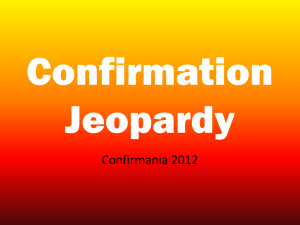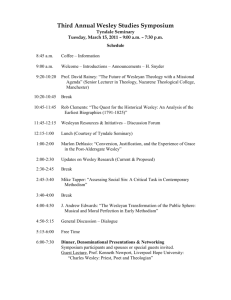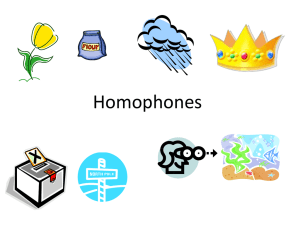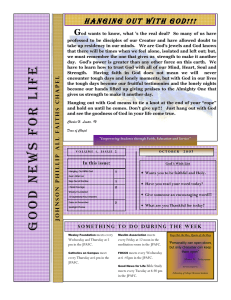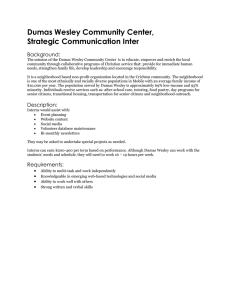Methodist Class Meeting Agenda: Spiritual Growth & Community
advertisement
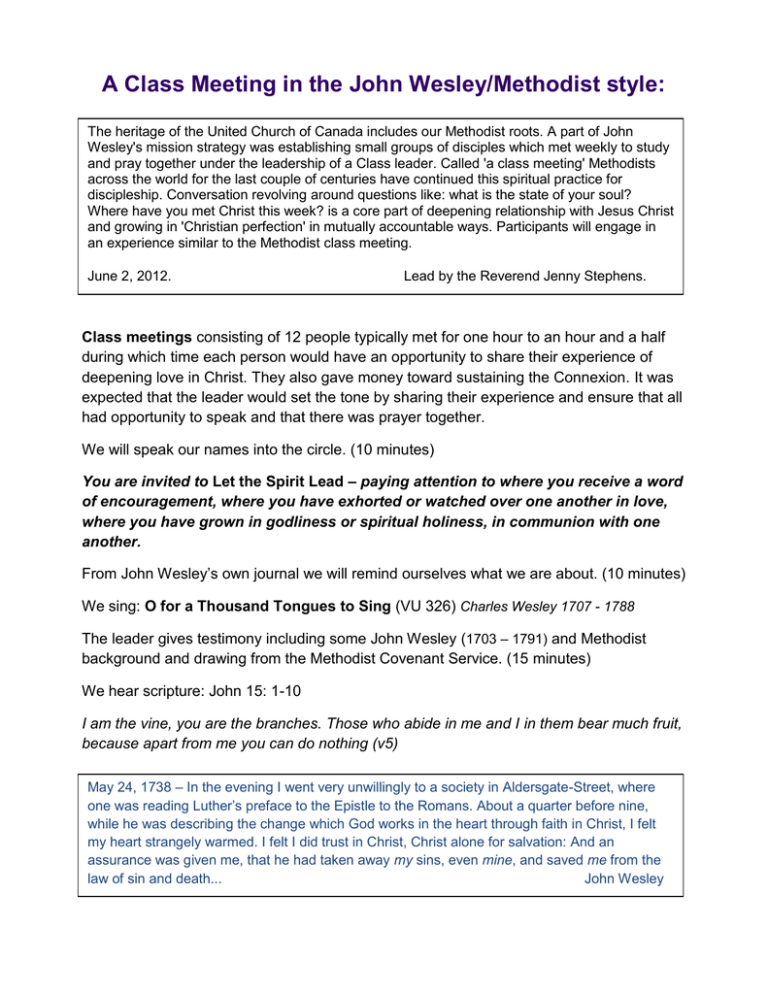
A Class Meeting in the John Wesley/Methodist style: The heritage of the United Church of Canada includes our Methodist roots. A part of John Wesley's mission strategy was establishing small groups of disciples which met weekly to study and pray together under the leadership of a Class leader. Called 'a class meeting' Methodists across the world for the last couple of centuries have continued this spiritual practice for discipleship. Conversation revolving around questions like: what is the state of your soul? Where have you met Christ this week? is a core part of deepening relationship with Jesus Christ and growing in 'Christian perfection' in mutually accountable ways. Participants will engage in an experience similar to the Methodist class meeting. June 2, 2012. Lead by the Reverend Jenny Stephens. Class meetings consisting of 12 people typically met for one hour to an hour and a half during which time each person would have an opportunity to share their experience of deepening love in Christ. They also gave money toward sustaining the Connexion. It was expected that the leader would set the tone by sharing their experience and ensure that all had opportunity to speak and that there was prayer together. We will speak our names into the circle. (10 minutes) You are invited to Let the Spirit Lead – paying attention to where you receive a word of encouragement, where you have exhorted or watched over one another in love, where you have grown in godliness or spiritual holiness, in communion with one another. From John Wesley’s own journal we will remind ourselves what we are about. (10 minutes) We sing: O for a Thousand Tongues to Sing (VU 326) Charles Wesley 1707 - 1788 The leader gives testimony including some John Wesley (1703 – 1791) and Methodist background and drawing from the Methodist Covenant Service. (15 minutes) We hear scripture: John 15: 1-10 I am the vine, you are the branches. Those who abide in me and I in them bear much fruit, because apart from me you can do nothing (v5) May 24, 1738 – In the evening I went very unwillingly to a society in Aldersgate-Street, where one was reading Luther’s preface to the Epistle to the Romans. About a quarter before nine, while he was describing the change which God works in the heart through faith in Christ, I felt my heart strangely warmed. I felt I did trust in Christ, Christ alone for salvation: And an assurance was given me, that he had taken away my sins, even mine, and saved me from the law of sin and death... John Wesley We will divide into 5 groups of five to share your own testimony. This may be in response to the question: what is the state of your soul? Or In this season of Pentecost where have you experienced the Spirit at work – in your own life, the life of the church community (however you define that community) or in the world. (30 minutes) We pray in small groups for each other (10 minutes) closing with reading Jesus, United by Your Grace (VU 591) Charles Wesley We sing: Love Divine, All Loves Excelling (VU 333) Charles Wesley We prepare to leave: Where in this experience have you received a word of encouragement, been conscious of watching another in Christian love, where you have grown in godliness or spiritual holiness, in communion with one another? In the large group be prepared to share as you feel comfortable. (15 minutes) Sharing the ‘Wesley Grace’ for our meal together: Be present at our Table, Lord; Be Here and Ev’ry Where ador’d; Thy creatures bless, and grant that we May feast in paradise with Thee. (John Cennick, 1741 a convert to Christ through Methodist life) Lord God, Holy Father, since you have called us through Christ to share in this gracious covenant, we take upon ourselves with joy the yoke of obedience and, for love of you, engage ourselves to seek and do your perfect will. We are no longer our own but yours. I am no longer my own but yours. Put me to what you will, rank me with whom you will; put me to doing, put me to suffering; let me be employed for you or laid aside for you, exalted for you or brought low for you; let me be full, let me be empty, let me have all things, let me have nothing; I freely and wholeheartedly yield all things to your pleasure and disposal. And now, Glorious and blessed God, Father, Son and Holy Spirit, you are mine and I am yours. So be it. And the covenant now made on earth, let it be ratified in heaven. Amen. Covenant prayer - From The Methodist Worship Book 1999 The Journal of John Wesley – May 1, 1738 This evening our little society began, which afterwards met in Fetter Lane. Our fundamental rules were as follows: In obedience to the command of God by St. James*, and by the advice of Peter Bohler, it is agreed by us, 1. That we will meet together once a week to ‘confess our faults one to another, and pray one for another, that we may be healed’. 2. That the persons so meeting be divided into several bands, or little companies, none of them consisting of fewer than five, or more than ten persons. 3. That every one in order speak as freely, plainly, and concisely as he can, the real state of his heart, with his several temptations and deliverances, since the last time of meeting. 4. That all the bands have a conference at eight every Wednesday evening, begun and ended with singing and prayer. 5. That any who desire to be admitted into this society be asked,’ what are your reasons for desiring this? Will you be entirely open; using no kind of reserve? Have you any objection to any of our orders?’ (which may then be read) 6. That when any new member is proposed, every one present speak clearly and freely whatever objection he has to him. 7. That those against whom no reasonable objection appears, be, in order for their trial, formed into one or more distinct bands, and some person agreed on to assist them. 8. That after two months’ trial, if no objection then appear, they may be admitted into the society. 9. That every fourth Saturday be observed as a day of general intercession. 10. That on the Sunday seven-night following be a general love-feast, from seven till ten in the evening. 11. That no particular member be allowed to act in any thing contrary to an order of the society: And that if any persons, after being thrice admonished, do not conform thereto, they be not any longer esteemed as members. * James 5:16 Confess your faults to one another, and pray one for another, that ye may be healed. From The Rules of the United Societies (taken from John Wesley ed. Outler p177) 1. In the latter end of the year 1739, eight or ten persons came to me in London, who appeared to be deeply convinced of sin, and earnestly groaning for redemption. They desired (as did two or three more the next day) that I would spend some time with them in prayer and advise them how to flee from the wrath to come, which they saw continually hanging over their heads. That we might have more time for this great work, I appointed a day when they might all come together, which from thenceforward they did every week, namely, on Thursday in the evening. To these, and as many more as desired to join with them (for their number increased daily) I gave those advices from time to time which I judged most needful for them; and we always concluded our meeting with prayer suited to their several necessities. 2. This was the rise of the United Society, first at London and then in other places. Such a society is no other than a company of men [sic- but it did include women] having the form and seeking the power of godliness, united in order to pray together, to receive the word of exhortation, and to watch over one another in love, that they may help each other to work out their salvation. 3. That it may the more easily be discerned whether they are indeed working out their own salvation, each society is divided into smaller companies called “classes,” according to their respective places of abode. There are about twelve persons in every class, one of whom is styled the Leader. It is his business: (1) To see each person in his class once a week at least, in order to inquire how their souls prosper; to advise, reprove, comfort, or exhort, as occasion may require; to receive what they are willing to give toward the relief of the poor; (2) To meet the minister and stewards of the society once a week; to pay to the stewards that they have received of their several classes in the week preceding; and to show their account of what each person has contributed. 4. There is one only condition previously required in those who desire admission into these societies – “a desire to flee from the wrath to come, to be saved from their sins.” But wherever this is really fixed in the soul, it will be shown by its fruits. It is therefore expected of all who continue therein, that they should continue to evidence their desire of salvation. First by doing no harm, avoiding evil in every kind; ............................ 5. It is expected of all who continue in these societies, that they should continue to evidence their desire of salvation: Secondly, by doing good, by being in every kind merciful after their power; as they have opportunity, by doing good of every possible sort, and as far as is possible to all.................................. 6. It is expected of all who continue in these societies, that they should continue to evidence their desire of salvation: thirdly, by attending upon all the ordinances of God. Such are the public worship of God; the ministry of the word, either read or expounded, the Supper of the Lord; private prayer; searching the Scriptures; and fasting, or abstinence. 7. These are the General Rules of our societies, all [of] which are taught by god to observe, even in his written word – the only rule, and the sufficient rule, both of our faith and practice. And all these, we know, his Spirit writes on every truly awakened heart.... From The Methodist Bedside Book p 93 quoting John Wesley re June 1741: But when a large number of people was joined, the great difficulty was, to keep them together. For they were continually scattering hither and thither, and we knew no way to help it. But God provided for this also, when we thought not of it. A year or two after, Mr. Wesley met with the chief of the society in Bristol, and inquired, ‘How shall we pay the debt upon the preaching- house?’ Captain Foy stood up and said, ‘Let every one in the society give a penny a week, and it will easily be done.’ ‘But many of them,’ said one, ‘have not a penny to give.’ ‘True,’ said the Captain; ‘then put tem or twelve of them to me. Let each of these give what they can weekly, and I will supply what is wanting.’ Many others made the same offer. So Mr. Wesley divided the societies among them; assigning a class of about twelve persons to each of these, who were termed Leaders... Not long after, one of these informed Mr. Wesley that, calling on such a one in his house, he found him quarrelling with his wife. Another was found in drink. It immediately struck Mr. Wesley’s mind, ‘This is the very thing we wanted. The Leaders are the persons who may not only receive the contributions, but also watch over the souls of their brethren.’ The society in London, being informed of this, willingly followed the example of that in Bristol; as did every other society from that time, whether in Europe or America. By this means, it was easily found if any grew weary or faint, and help was speedily administered. And if any walked disorderly, they were quickly discovered, and either amended or dismissed. Elements within the Society – Class – Band Method: (feel free to add to my list) Deepening relationship with Jesus Christ through: The work of the Spirit: justification – sanctification – Christian perfection. Accountability for discipleship and its fruits Exhortation, encouragement Support to change Fellowship Prayer Bible study Worship/singing Spiritual care Sharing resources Relationship with one another Communion with one another/love feasts Inclusive community (unlike others of the time these were mixed gender, class and age groups) Developed leadership – leaders, stewards, circuit preachers Freedom of expression yet confidential Local and convenient groups yet connected to the whole Methodist Connexion (societies gathered in to circuits - to districts - to Conference) RESOURCES – A BEGINNING LIST: Books: The Journal of John Wesley. A Selection. ed. Elisabeth Jay 1987 Oxford University Press. John Wesley’s Forty-Four Sermons. Epworth Press. (fifteenth impression of 1944 edition, 1985) John Wesley ed Albert C. Outler 1964 Oxford University Press. The Methodist Bedside Book ed. Rev Ralph Kirby 1954 Hulton Press, London A Year with John Wesley and Our Methodist Values Michael J. Coyner, Henry H. Knight III, Sarah Heaner Lancaster, Randy l. Maddox, F. Douglas Powe Jr. 2008 Discipleship Resources (www.discipleshipresources.org) The Gospel According to Wesley: A Summary of John Wesley’s Message. Lovett Hayes Weems, Jr. 1982 Discipleship Resources. Recapturing the Wesley’s Vision: An Introduction to the Faith of John and Charles Wesley. Paul Wesley Chilcote 2004 Inter Varsity Press. A Model for Making Disciples: John Wesley’s Class Meeting. D. Michael Henderson 1997 Evangel Publishing House. Restoring the Wesleyan Class- Meeting: Implement the HEART of Methodism for the 21st Century. Dr. Molly Davis Scott and Dr. James B Scott 2006 Provident Publishing (www.cokesbury.com). Helpful Websites: The Methodist Church of Great Britain: www.methodist.org.uk. Note especially Resurrecting the Classes: An Introduction to Cell Church for Methodists.2007. and its link to www.celluk.org.uk. The United Methodist Church: www.umc.org. Wesley scholar: www.victorshepherd.on.ca Articles gleaned through the web: The General Rules of the Methodist Class Meetings Dennis Bratcher, ed. www.crivoice.org/creedclass.html Class meetings, a part of Methodist history, have relevance today by Linda Bloom. www.archives.umc.org. The Methodist Class Meeting: Principles of Spiritual Formation and Application to Christian Discipleship Steven H. Guptill June 1, 2010 O FOR THOUSAND TONGUES TO SING. O for a thousand tongues to sing My great Redeemer’s praise, The glories of my God and King, The triumphs of His grace! Jesus! the name that charms our fears, That bids our sorrows cease; ’Tis music in the sinner’s ears, ’Tis life, and health, and peace. He speaks, and, listening to His voice, New life the dead receive, The mournful, broken hearts rejoice, The humble poor believe. Finish then thy new creation Pure and spotless let us be; Let us see thy great salvation, Perfectly restored in thee, Changed from glory into glory, Till in heaven we take our place, Till we cast our crowns before thee, Lost in wonder, love, and praise! Charles Wesley 1747 JESUS, UNITED BY THY GRACE. 1 Jesus, united by thy grace and each to each endeared, with confidence we seek thy face and know our prayer is heard. 2. Help us to help each other, Lord, each other's cross to bear; let all their friendly aid afford, and feel each other's care. 3. Up unto thee, our living Head, let us in all things grow; till thou hast made us free indeed and spotless here below. 4. Touched by the lodestone of thy love, let all our hearts agree, and ever toward each other move, and ever move toward thee. Hear Him, ye deaf; His praise, ye dumb, Your loosened tongues employ; Ye blind, behold your Savior come, And leap, ye lame, for joy. My gracious Master and my God, Assist me to proclaim, To spread through all the earth abroad The honors of Thy name. Charles Wesley 1739 LOVE DIVINE, ALL LOVES EXCELLING. Love Divine, all loves excelling, Joy of heaven, to earth come down, Fix in us thy humble dwelling, All thy faithful mercies crown. Jesus, thou art all compassion, Pure unbounded love thou art; Visit us with thy salvation, Enter every trembling heart. Come, almighty to deliver, Let us all thy grace receive; Suddenly return, and never, Never more thy temples leave. Thee we would be always blessing, Serve thee as thy hosts above, Pray, and praise thee, without ceasing, Glory in thy perfect love. Charles Wesley 1742

